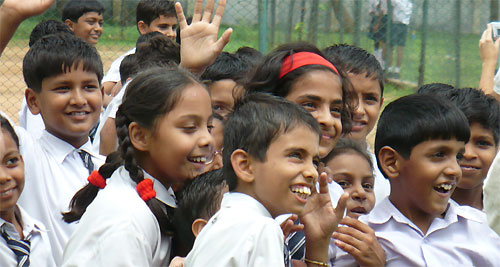|
A hub of knowledge or a club of idiocy?
By Vijitha Herath Nov 23, 2011 | |
 The ‘future vision’ of the government regarding education has been announced; it is to make Sri Lanka the ‘hub of education’ in Asia. This, at face value, looks a very attractive slogan as well as one that could be ‘marketed’ for people for a considerable period of time. The masses will take a considerable amount of time to comprehend the deceitful manipulations concealed behind these beautiful words. J.R. Jayewardene by introducing neo-liberalist Open Economy to this country in 1977 expected to allow all sectors to be decided based on market forces. Education did not escape by being one of its targets. It is for this reason the ‘white paper on education’ was unfolded in 1981. However, he could not implement all the reforms in the ‘white paper’ due to opposition by students and people’s forces. Open economy was shoved forward. However, creating a ‘ human being’ that suits this system through education had to wait. Attempts to directly privatize education were temporarily withdrawn when an attempt to open and maintain a private medical college at Ragama in 1984 was thwarted by mass protests in which several students laid down their lives. This was until President Mahinda Rajapaksa commenced his second term. At present the task of‘ re-structuring’ of education to suit the neo liberalist path of Rajapaksa government has been handed over to Minister S.B. Dissanayake. President Rajapaksa can expect the highest commitment from him for this task. For, he is one that not only got a presidential pardon to escape a prison term but one that crossed over from his political party to grab a ministerial portfolio. On the other hand, he, who had his primary education in Poramadulla Central College, a school in a distant rural area and had his higher education at Vidyodaya University thanks to free education, being empowered to end free education in Sri Lanka is akin to a mockery of history. Rajapaksa government’s approach to education is twofold. The first is to change the educational curricular to create a labour force that would suit the new liberalist economy. The proposal to issue a certificate at grade 8 and give an opportunity to terminate school education is one such proposal. It is for this reason that proposals are made to prepare university courses targeting market requirements. The second approach of the government is to directly privatize education. The proposal to take, under the wings of the Department of Education, private schools that are registered as companies and opening avenues to establish private universities indicate this requirement. The government has already granted authority to the controversial Malabe medical school to issue degree certificates. The government conceals its vile intentions by stating their move would broaden higher educational opportunities. However, the truth is by slashing grants and allocations for education the government restricts access to free education and one by one closes its doors. The reduction of allocations for education from 2009 until now (2012) is an example. In 2009 the allocation for education was 2.15 per cent of the total expenditure. In 2010 it was reduced to 2.06 per cent and it was further reduced in 2011 to 1.95 per cent. According to budget estimate for 2012 it is 1.89 per cent. Now the government asks universities to sell their courses to find funds for their maintenance. The government composes fairy tales of carrying out maintenance and development of universities by selling courses to local as well as foreign students. Such attempts of the government to conceal the clipping of allocations and its attempt to get free from the responsibility of education are outrageous. This is the bitter reality of the attempt of making Sri Lanka the ‘hub of knowledge’ to attract students from the countries in the region. What would be left in the existing university system once a rich private university that would come into being under this system draws the developed human resources from them? Those students who are destined to follow ‘free education’ would have to enter these ‘hollow’ universities and loiter without getting a proper education. On the other hand government’s talk of broadening opportunities of education by private universities is another canard. While a student from a poor family who failed to obtain the free access by a few marks is sighing and moaning, a ‘lucky chap’ who had obtained very few marks at the examination but fortunate to be able to spend Rs.6 million could become a doctor and treat the ‘poor chap.’ Masses who hear and see students in western countries struggling against rising course fees in private universities in those countries are in a quandary as to why the government is making such an attempt to pull a fast one on them. Under these conditions what would be broadening are not opportunities but frustration and impatience. Also, the government by closing or creating situations for a large number of primary schools to be closed down may be hoping to control beforehand the pressure that would be on ‘free access.’ Parents have been already burdened with the maintenance of the school. Parents have to spend for various school necessities from painting class rooms to paying teachers who have been hired. This is apart from school fees, supplementary books, tuition fees and transport. When generally the cost of ‘free access’ too is rising, anyone who has not thought about the flagitiousness of privatization could assume how it would be. The actual fact under such conditions is that Sri Lanka would not become the hub of knowledge but a club of idiocy. Source: Daily Mirror - Sri Lanka
|
|